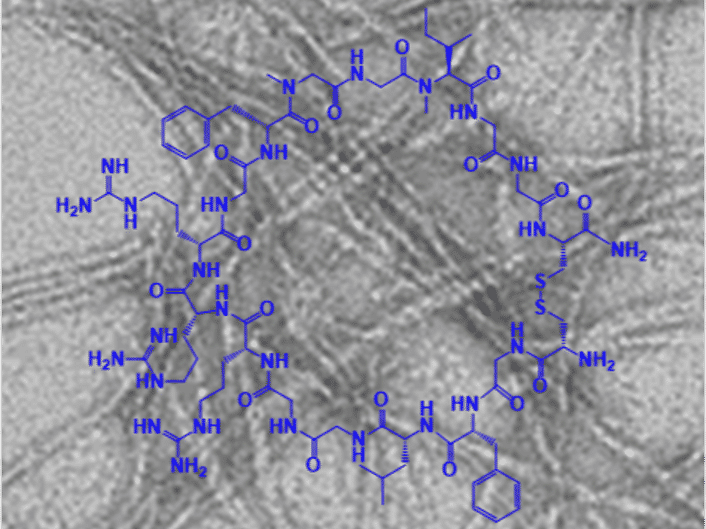Alzheimer's disease and diabetes: Hope for inhibitors
Designed peptides as potential inhibitors of amyloid plaques
Effective therapeutics to counteract the formation of amyloid plaques in Alzheimer's disease and type 2 diabetes are not yet available. Scientists at the Technical University of Munich (TUM) have now come a little bit closer to a solution: They have described a new class of designed macrocyclic peptides that are highly potent inhibitors of amyloid formation.

A new class of designed macrocyclic peptides has been developed which are highly potent inhibitors of amyloid plaque formation.
Kapurniotu/ TUM
Amyloid plaques, which are protein deposits, play a crucial role in the development of Alzheimer's disease and type 2 diabetes. Several teams of scientists around the world are working on finding ways to prevent amyloid plaque formation in the human brain.
The research team of Aphrodite Kapurniotu, Professor for Peptide Biochemistry (TUM) has been working on an idea for some time now in collaboration with the teams of Professor Martin Zacharias (TUM), Professor Gerhard Rammes (TUM Rechts der Isar Hospital) and Professor Jürgen Bernhagen (Institute for Stroke and Dementia Research (ISD) at Ludwig Maximilian University (LMU)). The researchers present now macrocyclic peptides (MCIPs) as potent inhibitors of amyloid formation.
New class of amyloid inhibitors
In its new study, the team presents macrocyclic peptides, developed as a new class of amyloid inhibitors. "We have discovered an MCIP that is stable in human blood plasma and can also overcome the human blood-brain barrier in an in vitro cell culture model," explains Professor Kapurniotu. She adds: "So far we were 'only' able to demonstrate these properties in the test tube - thus further research is necessary. But these are two highly desirable properties for inhibitors of Alzheimer's amyloid."
TUM has already applied for a patent for the newly developed macrocyclic peptides. "They could be a good alternative to the currently pursued antibody-based approaches as therapeutics against Alzheimer's amyloid plaque formation because they are easy to produce, have promising properties and, due to their peptidic nature, they will be significantly cheaper than antibodies," says Professor Kapurniotu.
"Therefore, further investigations are now planned to verify whether the MCIPs are also effective in in vivo models. Furthermore, the MCIPs could also be suitable as templates for the development of small molecule peptidomimetics (molecules mimicking peptide chains), which might also find application as anti-amyloid drugs in Alzheimer's and type 2 diabetes.
Original publication
Anna Spanopoulou, Luzia Heidrich, Hong‐Ru Chen, Christina Frost, Dean Hrle, Eleni Malideli, Kathleen Hille, Alexandros Grammatikopoulos, Jürgen Bernhagen, Martin Zacharias, Gerhard Rammes and Aphrodite Kapurniotu; "Designed Macrocyclic Peptides as Nanomolar Amyloid Inhibitors Based on Minimal Recognition Elements"; Angew Chem Int Ed Engl. 06/2018.
Most read news
Original publication
Anna Spanopoulou, Luzia Heidrich, Hong‐Ru Chen, Christina Frost, Dean Hrle, Eleni Malideli, Kathleen Hille, Alexandros Grammatikopoulos, Jürgen Bernhagen, Martin Zacharias, Gerhard Rammes and Aphrodite Kapurniotu; "Designed Macrocyclic Peptides as Nanomolar Amyloid Inhibitors Based on Minimal Recognition Elements"; Angew Chem Int Ed Engl. 06/2018.
Topics
Organizations
Other news from the department science

Get the life science industry in your inbox
By submitting this form you agree that LUMITOS AG will send you the newsletter(s) selected above by email. Your data will not be passed on to third parties. Your data will be stored and processed in accordance with our data protection regulations. LUMITOS may contact you by email for the purpose of advertising or market and opinion surveys. You can revoke your consent at any time without giving reasons to LUMITOS AG, Ernst-Augustin-Str. 2, 12489 Berlin, Germany or by e-mail at revoke@lumitos.com with effect for the future. In addition, each email contains a link to unsubscribe from the corresponding newsletter.





















































